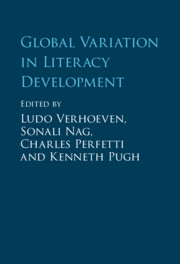Book contents
- Global Variation in Literacy Development
- Global Variation in Literacy Development
- Copyright page
- Contents
- Figures
- Tables
- Contributors
- Abbreviations
- 1 Introduction
- Part I Regional Variations
- 2 Sociocultural Variation in Literacy Development in Canada and the United States
- 3 Literacy Contexts and Literacy Development in South America
- 4 Postcolonial Literacy Development in the Caribbean
- 5 Literacy Development in Europe
- 6 Literacy Education and Development in Russia
- 7 Literacy Development and Language of Instruction in Sub-Saharan Africa
- 8 Literacy and Linguistic Diversity in Multilingual India
- 9 Literacy Development in East Asia
- 10 Literacy and Linguistic Diversity in Australia
- Part II Neurobiological and Ecological Markers
- Index
- References
6 - Literacy Education and Development in Russia
from Part I - Regional Variations
Published online by Cambridge University Press: 23 November 2023
- Global Variation in Literacy Development
- Global Variation in Literacy Development
- Copyright page
- Contents
- Figures
- Tables
- Contributors
- Abbreviations
- 1 Introduction
- Part I Regional Variations
- 2 Sociocultural Variation in Literacy Development in Canada and the United States
- 3 Literacy Contexts and Literacy Development in South America
- 4 Postcolonial Literacy Development in the Caribbean
- 5 Literacy Development in Europe
- 6 Literacy Education and Development in Russia
- 7 Literacy Development and Language of Instruction in Sub-Saharan Africa
- 8 Literacy and Linguistic Diversity in Multilingual India
- 9 Literacy Development in East Asia
- 10 Literacy and Linguistic Diversity in Australia
- Part II Neurobiological and Ecological Markers
- Index
- References
Summary
This chapter goes into literacy education and literacy development in Russia. The understanding of literacy in Russia requires analysis of several issues. To begin with, historical changes in the provision of education in the region, and the introduction of a modern educational system in preschool (kindergarten age four-to-six years) and primary school (Grades 1-4) need to be considered. This is because, in recent years, a transformation has been recorded in both the number of educational institutions and the nature of the educational process. Furthermore, the Russian scholarship on writing and reading disorders requires examination alongside several internal contradictions and inconsistencies in the approaches to psychological and pedagogical support available for children with these disorders. The situation may be described as a disconnection between the diagnostic processes and remedial methods used in Russia and the international experience. This chapter starts out with a description of the Russian writing system. This will be followed by an overview of teaching and assessment methods used over the past decades. Finally, a reflection will be provided on the identification of children with reading problems and remediation of those problems.
- Type
- Chapter
- Information
- Global Variation in Literacy Development , pp. 118 - 132Publisher: Cambridge University PressPrint publication year: 2023



